人教精通版小学英语下册六年级五六单元知识点
六年级英语下册知识讲义-Units 5-6语法归纳-人教版(五四学制)
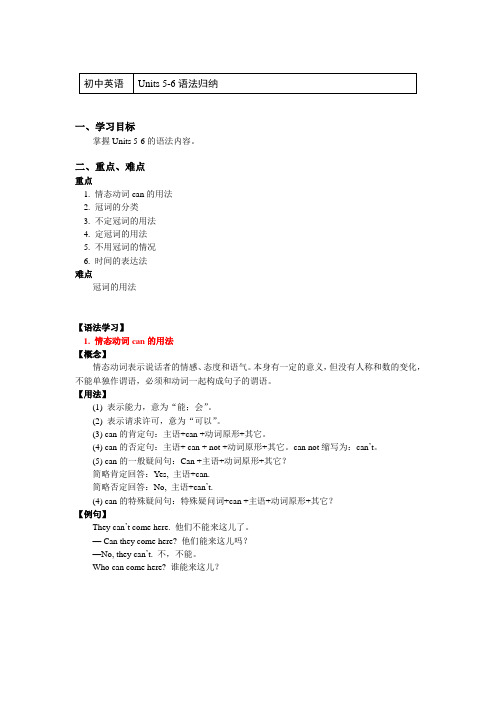
一、学习目标掌握Units 5-6的语法内容。
二、重点、难点重点1. 情态动词can的用法2. 冠词的分类3. 不定冠词的用法4. 定冠词的用法5. 不用冠词的情况6. 时间的表达法难点冠词的用法【语法学习】1. 情态动词can的用法【概念】情态动词表示说话者的情感、态度和语气。
本身有一定的意义,但没有人称和数的变化,不能单独作谓语,必须和动词一起构成句子的谓语。
【用法】(1) 表示能力,意为“能;会”。
(2) 表示请求许可,意为“可以”。
(3) can的肯定句:主语+can +动词原形+其它。
(4) can的否定句:主语+ can + not +动词原形+其它。
can not缩写为:can’t。
(5) can的一般疑问句:Can +主语+动词原形+其它?简略肯定回答:Yes, 主语+can.简略否定回答:No, 主语+can’t.(4) can的特殊疑问句:特殊疑问词+can +主语+动词原形+其它?【例句】They can’t come here. 他们不能来这儿了。
— Can they come here? 他们能来这儿吗?—No, they can’t. 不,不能。
Who can come here? 谁能来这儿?【考题链接】—_____ he swim?—Yes, he can.A. DoesB. DoC. CanD. Is答案:C思路分析:根据答语he can可知问句用can提问,故选C项。
【拓展】情态动词must的用法:(1) 意为“必须”,表示义务、命令或要求。
(2) 含有must的一般疑问句其否定回答用:needn’t。
【例句】We must speak English in class. 我们必须在课堂上说英语。
— Must he go there? 他必须去那儿吗?—No, he needn’t. 不,他不必。
【即学即练】用can或can’t 填空1. I can play soccer, but I _____ play basketball.2. —Can you play chess?—Yes, I _____.3. I’m sorry I _____ speak English.4. _____ you bring some strawberries to me?5. —____ your father swim?—No, he _____.答案:1. can’t 2. can 3. can’t 4. Can 5. Can; can’t2. 冠词【概念】冠词是一种虚词,不能单独承担一个句子成分,只能和一个名词一起使用,帮助说明其词义。
新人教版小学英语六年级下册各单元重点考点总结
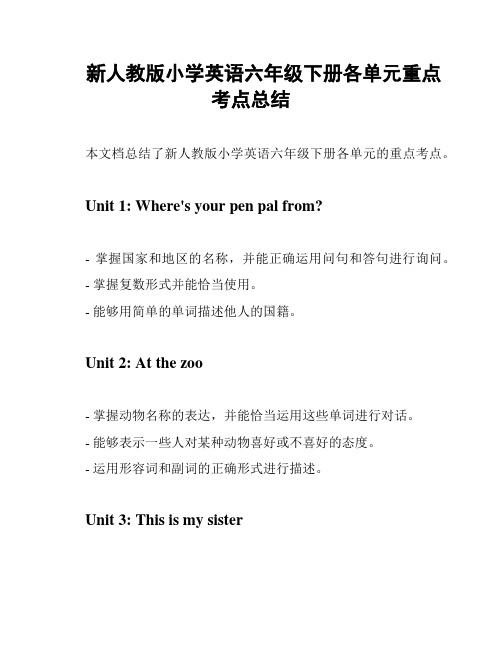
新人教版小学英语六年级下册各单元重点考点总结本文档总结了新人教版小学英语六年级下册各单元的重点考点。
Unit 1: Where's your pen pal from?- 掌握国家和地区的名称,并能正确运用问句和答句进行询问。
- 掌握复数形式并能恰当使用。
- 能够用简单的单词描述他人的国籍。
Unit 2: At the zoo- 掌握动物名称的表达,并能恰当运用这些单词进行对话。
- 能够表示一些人对某种动物喜好或不喜好的态度。
- 运用形容词和副词的正确形式进行描述。
Unit 3: This is my sister- 掌握表示家庭成员关系的词汇,并能在合适的情境下熟练使用。
- 能够用简单的句子表达自己和他人的家庭成员状况。
- 掌握疑问句和肯定/否定回答的语法结构。
Unit 4:What do you usually do on weekend?- 掌握表示日常活动和娱乐爱好的名词和动词,并能在合适的情境下熟练使用。
- 能够描述周末的计划,并能够用适当的时态表达过去、现在和未来的时间。
- 学会以礼貌的方式询问和回答他人的问题。
Unit 5: What's the matter?- 能够描述自己的身体不适,并能运用一些常用的疾病词汇。
- 掌握表示询问、建议和回答的用语,并能在合适的情境下使用。
- 学会表示关心和病愈等祝福的表达方式。
Unit 6: It's raining- 学会用简单的句子描述天气情况,并能表达对不同天气的态度。
- 掌握天气形容词的表达方式。
- 能够描述不同季节的气温、天气和风景。
总之,在学习小学英语六年级下册的过程中,应注重关注以上重点考点,并在实际中多进行运用练习,以此提高英语水平。
六年级英语下册5-8单元知识点梳理
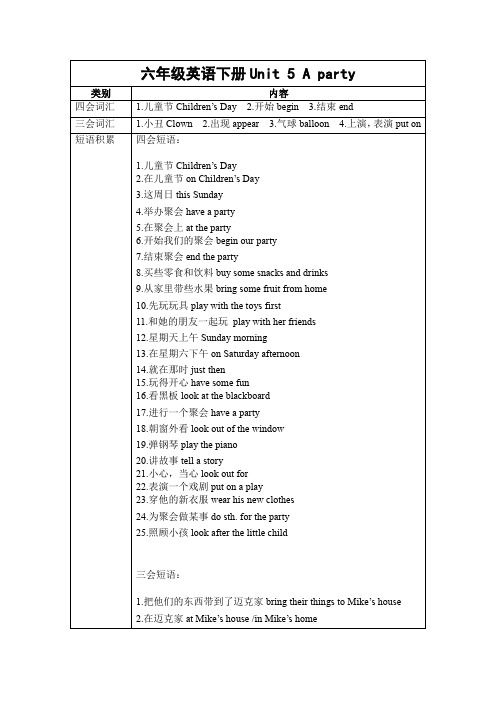
3.What is he/she going to do at the party?
他/她打算在聚会上做什么?
4.He/She is going to play with some toys at the party.
他/她打算在聚会上玩一些玩具。
5.Areyou/we/they going to bring some snacks to the party?
4.体育爱好者Sport- lover
5.澳大利亚的人们People in Australia
6.找到一些澳大利亚的照片find some photos of Australia
重点句型
1.What do you think?你认为呢?
2.I’ll send an email to my friend in Australia.
文化渗透
了解在西方参加聚会的礼仪和注意事项
1.在没有特殊着装要求的情况下,衣着要尽量整洁大方。
2.礼物可以选一瓶酒、一束鲜花或一个小工艺品。
3.按时到达,不要太早,也不要太迟。
4.入座用餐时,要让主人、长者和女士先坐。
5.餐巾应铺在大腿上。
6.当女主人开动时,才开始进餐。
7.用餐时坐姿要端正。
8.进餐速度不宜太快,也不宜太慢。
我打算发一份电子邮件给我澳大利亚的朋友。
3.You’ll find many interesting things in Australia.
你将会在澳大利亚发现很多有趣的事情。
4.We’ll learn about Australia next week.
我们打算下周了解澳大利亚。
5.They’ll find out about this country next week.
人教精通版6年级上下册重点单词和句型默写
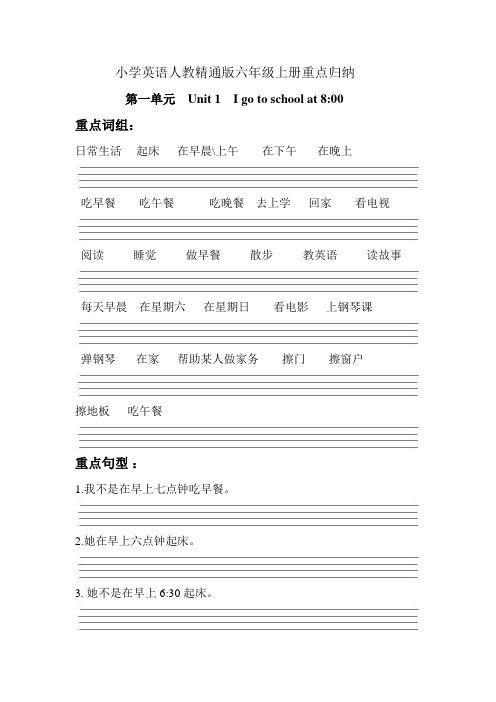
小学英语人教精通版六年级上册重点归纳第一单元Unit 1 I go to school at 8:00重点词组:日常生活起床在早晨\上午在下午在晚上吃早餐吃午餐吃晚餐去上学回家看电视阅读睡觉做早餐散步教英语读故事每天早晨在星期六在星期日看电影上钢琴课弹钢琴在家帮助某人做家务擦门擦窗户擦地板吃午餐重点句型:1.我不是在早上七点钟吃早餐。
2.她在早上六点钟起床。
3. 她不是在早上6:30起床。
4.凯特在周六做什么?5. 她通常弹钢琴。
6.我在7:30吃早饭。
7.我在12:00吃午饭。
8.我在6:00吃晚餐。
9.你在周六干什么?10.我经常去看电影。
第二单元Unit 2 What's your hobby? 重点词组:1. 一辆新的玩具汽车2. 看一看3. 收集玩具汽车4. 收集邮票5.收集地图6. 收集卡片7. 看8. 种花9. 喝中国茶10. 去钓鱼11. 做饭12. 对……感兴趣13. 做布娃娃14. 玩电脑游戏15. 照相16.照顾好17. 谈论18.打篮球19. 寻找20. 在冬天21. 从……到……22. 在夜间23. 在世界上重点句型:1. 你爷爷的爱好是什么?2. 他的爱好是钓鱼。
3. 你对什么感兴趣?4.我对拍照感兴趣。
5. 你的爱好是什么?6. 我的爱好是收集地图。
6. 你爸爸的爱好是什么?7. 他的爱好是种花。
第三单元Unit 3 Would you like to come to my birthday party?重点词组:生日聚会放学后邀请卡邀请朋友参加聚会与朋友庆祝生日向朋友赠送生日贺卡星形蛋糕心形蛋糕水果派\水果馅饼点蜡烛唱生日歌许愿吹蜡烛切蛋糕吃蛋糕一块蛋糕重点句型:1. 你想要什么种类的蛋糕?2.我想要一个心形的蛋糕。
3. 他们怎么庆祝生日的?4. 首先,他们点燃蜡烛,然后……5.你愿意来我的生日晚会吗?6. 当然,我愿意。
7. 再见。
8.我能吃些冰激凌吗?9. 这个生日蛋糕师送给你的。
人教精通版小学英语下册六五六单元知识点
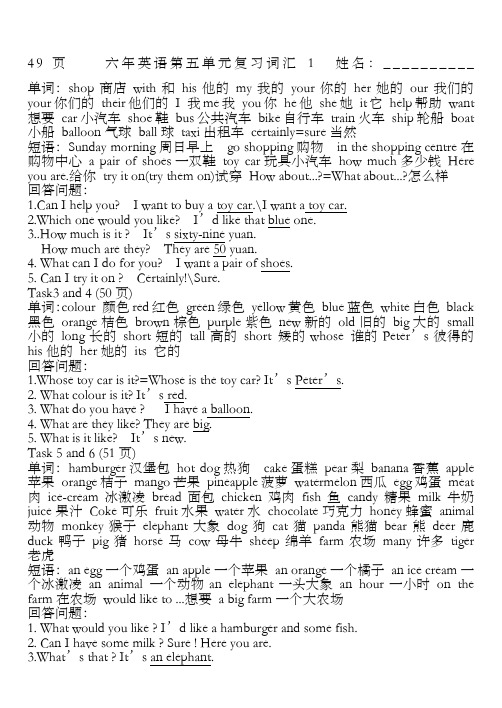
49页六年英语第五单元复习词汇1姓名:__________ 单词:shop商店with和his他的my我的your你的her她的our我们的your你们的their他们的I 我me我you你he他she她it它help帮助want 想要car小汽车shoe鞋bus公共汽车bike自行车train火车ship轮船boat 小船balloon气球ball球taxi出租车certainly=sure当然短语:Sunday morning周日早上go shopping购物in the shopping centre在购物中心a pair of shoes一双鞋toy car玩具小汽车how much多少钱Here you are.给你try it on(try them on)试穿How about...?=What about...?怎么样回答问题:1.Can I help you? I want to buy a toy car.\I want a toy car.2.Which one would you like? I’d like that blue one.3..How much is it ? It’s sixty-nine yuan.How much are they? They are 50 yuan.4. What can I do for you? I want a pair of shoes.5. Can I try it on ? Certainly!\Sure.Task3 and 4 (50页)单词:colour 颜色red红色green绿色yellow黄色blue蓝色white白色black 黑色orange桔色brown棕色purple紫色new新的old旧的big大的small 小的long长的short短的tall高的short 矮的whose 谁的Peter’s彼得的his他的her她的its 它的回答问题:1.Whose toy car is it?=Whose is the toy car? It’s Peter’s.2. What colour is it? It’s red.3. What do you have ? I have a balloon.4. What are they like? They are big.5. What is it like? It’s new.Task 5 and 6 (51页)单词:hamburger汉堡包hot dog热狗cake蛋糕pear梨banana香蕉apple 苹果orange桔子mango芒果pineapple菠萝watermelon西瓜egg鸡蛋meat 肉ice-cream冰激凌bread面包chicken鸡肉fish鱼candy糖果milk牛奶juice果汁Coke可乐fruit水果water水chocolate巧克力honey蜂蜜animal 动物monkey猴子elephant大象dog狗cat猫panda熊猫bear熊deer鹿duck鸭子pig猪horse马cow母牛sheep绵羊farm农场many许多tiger 老虎短语:an egg一个鸡蛋an apple一个苹果an orange一个橘子an ice cream一个冰激凌an animal 一个动物an elephant一头大象an hour一小时on the farm在农场would like to ...想要a big farm一个大农场回答问题:1. What would you like ? I’d like a hamburger and some fish.2. Can I have some milk ? Sure ! Here you are.3.What’s that ? It’s an elephant.4. What are these? They are monkeys and pandas.Task 7 and 8(52页)六年英语第五单元复习词汇2 姓名:__________名词变复数规则:1.一般在末尾加S.2.以s,sh,ch,x结尾的词末尾加es.3. 以辅音字母加y结尾的,把y变成i,再加es.4. 以f,fe结尾的名词,把f,fe变成v加es.不规则的名词复数:sheep----sheep绵羊people----people人Chinese----Chinese 中国人child----children 小孩foot----feet脚tooth----teeth牙mouse----mice老鼠man----men男人woman----women女人单词:card 卡片love爱pen 钢笔book书computer电脑clock钟表fan电扇T-shirt T恤衫skirt短裙coat大衣sweater毛衣shorts短裤dress连衣裙umbrella雨伞bike自行车pen 钢笔pencil铅笔pencil-box铅笔盒textbook课本ruler格尺schoolbag书包sharpener卷笔刀desk书桌chair椅子one一two二three三four四five 五six六seven七eight八nine九ten十eleven十一twelve十二thirteen十三fourteen 十四fifteen十五sixteen十六seventeen十七eighteen十八nineteen十九twenty二十twenty-one二十一twenty-nine二十九thirty三十forty四十fifty五十sixty六十seventy 七十eighty八十ninety九十a hundred一百gift礼物first第一second第二third 第三fourth第四fifth第五sixth第六seventh第七eighth第八ninth第九tenth第十基数变序数词的口诀:基变序,有规律。
完整版小学英语人教精通版六年级下册重点归纳
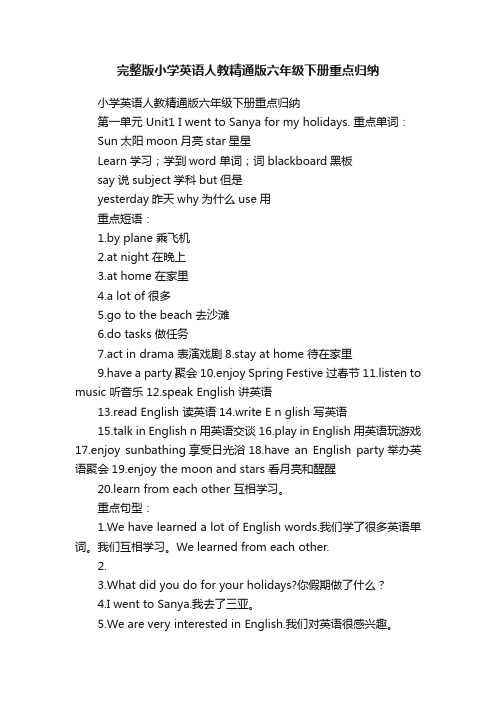
完整版小学英语人教精通版六年级下册重点归纳小学英语人教精通版六年级下册重点归纳第一单元 Unit1 I went to Sanya for my holidays. 重点单词:Sun太阳moon月亮star星星Learn学习;学到word 单词;词blackboard黑板say 说subject学科but但是yesterday昨天why为什么use用重点短语:1.by plane 乘飞机2.at night 在晚上3.at home 在家里4.a lot of 很多5.go to the beach 去沙滩6.do tasks 做任务7.act in drama 表演戏剧8.stay at home 待在家里9.have a party 聚会10.enjoy Spring Festive 过春节11.listen to music 听音乐12.speak English 讲英语13.read English 读英语14.write E n glish 写英语15.talk in English n用英语交谈16.play in English 用英语玩游戏17.enjoy sunbathing享受日光浴18.have an English party举办英语聚会19.enjoy the moon and stars 看月亮和醒醒20.learn from each other 互相学习。
重点句型:1.We have learned a lot of English words.我们学了很多英语单词。
我们互相学习。
We learned from each other.2.3.What did you do for your holidays?你假期做了什么?4.I went to Sanya.我去了三亚。
5.We are very interested in English.我们对英语很感兴趣。
6.How did you learn English?你(们)是怎么学英语的?7.We learned English by doing things.我们通过做事情来学英语。
人教版六年级英语下册各单元必背词汇和句型
人教版六年级英语下册各单元必背词汇和句型以下是人教版六年级英语下册各单元的必背词汇和句型:第一单元词汇春天 spring夏天 summer秋天 autumn冬天 winter季节 seasons句型My favourite season is... 我最喜欢的季节是…Why do you like...? 你为什么喜欢…?Because I can... 因为我可以…第二单元词汇游泳 swim滑冰 skate放风筝 fly a kite堆雪人 make a snowman季节活动 seasonal activities句型What do you do in the...? 你在…做什么?I usually... 我通常…Do you often...? 你经常…吗?Yes, I do. / No, I don’t. 是的,我经常。
/ 不,我不经常。
第三单元词汇星期一 Monday星期二 Tuesday星期三 Wednesday星期四 Thursday星期五 Friday星期六 Saturday星期日 Sunday星期 weekdays星期天 weekends句型What do you have on...? 你星期几有什么课?I have... 我星期几有…课。
When do you have...? 你什么时候有…课? I have... on... 我在星期几有…课。
第四单元词汇电影 movies公园 parks图书馆 libraries博物馆 museums商店 shops饭店 restaurants医院 hospitals学校 schools银行 banks邮局 post offices公共场所 public places 句型。
六年级下册英语全册知识点人教版
六年级下册英语全册知识点人教版篇1Sixth Grade English Book Knowledge PointsUnit 1 Making new friendsIn this unit, students will learn how to introduce themselves and others, ask and answer questions about personal information, talk about hobbies, and make new friends. They will also learn how to describe people’s appearance and personality.Vocabulary:- introduce- neighbor- hobby- personality- appearance- slim- generous- helpfulGrammar:- Singular and plural nouns- Simple present tense- Possessive adjectives- Subject pronounsUnit 2 CommunicationIn this unit, students will learn how to communicate effectively using different types of communication, such as email, telephone calls, and face-to-face conversations. They will also learn how to give and follow directions and ask for help.Vocabulary:- communication- conversation- telephone call- email- message- direction- ask for help- close friendGrammar:- Wh-questions- Imperative sentences- Articles a/an/theUnit 3 A visit to the zooIn this unit, students will learn how to describe animals, talk about their habitats and diets, and discuss conservation efforts. They will also learn how to express their preferences and make comparisons.Vocabulary:- animal- habitat- diet- conservation- prefer- compare- differentGrammar:- Adjectives- Comparative and superlative forms- can/can’tUnit 4 Our school tripIn this unit, students will learn how to describe past events, share their experiences, and talk about their feelings. They will also learn how to use the past simple tense and adverbs of frequency.Vocabulary:- trip- experience- feeling- explore- enjoy- prepare- excitedGrammar:- Past simple tense- Adverbs of frequency- Prepositions of timeUnit 5 Health and fitnessIn this unit, students will learn how to talk about health and fitness, describe symptoms of illness, give advice, and discuss healthy habits. They will also learn how to use modal verbs for advice and suggestions.Vocabulary:- health- fitness- symptom- advice- healthy- habits- restGrammar:- Modal verbs (should/shouldn’t, can/can’t)- Comparative and superlative forms of adjectives- Direct and indirect speechUnit 6 A special invitationIn this unit, students will learn how to respond to invitations, make plans, and organize events. They will also learn how to use future forms of verbs and adverbs of manner.Vocabulary:- invitation- respond- plan- organize- event- future- verbGrammar:- Future forms of verbs (will/shall)- Adverbs of manner- Conditional sentencesBy the end of the sixth grade English book, students will have developed their language skills in speaking, listening, reading, and writing. They will be able to communicate effectively in different situations and confidently express their thoughts and ideas.篇2Sixth Grade English Language Arts Knowledge Points in the People's Education PressThis document will provide an overview of the knowledge points covered in the sixth-grade English language arts curriculum published by the People's Education Press. These knowledge points are designed to help students improve their English language skills and enhance their overall comprehension of the language. By mastering these points, students will bewell-equipped to succeed in their language arts studies and beyond.1. Reading Comprehension: In the sixth-grade curriculum, students will focus on improving their reading comprehension skills. They will learn how to analyze and interpret texts, identify key details, draw inferences, and make connections between different pieces of text. They will also learn how to identify the main idea of a text and summarize passages effectively.2. Vocabulary Building: A strong vocabulary is essential for effective communication in English. Students will expand their vocabulary by learning new words and phrases in various contexts. They will also learn how to use context clues to infer the meaning of unfamiliar words and how to use a dictionary effectively.3. Writing Skills: Writing is an important aspect of the language arts curriculum. Students will learn how to write clear and coherent essays, reports, and narratives. They will also learn how to use proper grammar, punctuation, and spelling in their writing. Additionally, students will learn how to revise and edit their writing to improve clarity and coherence.4. Grammar: A solid understanding of grammar is essential for effective communication in English. Students will learn aboutdifferent parts of speech, sentence structure, verb tenses, and subject-verb agreement. They will also learn how to use pronouns, prepositions, and conjunctions correctly in their writing.5. Speaking and Listening Skills: Effective communication involves both speaking and listening. Students will learn how to speak clearly and confidently in a variety of settings. They will also learn how to listen actively and attentively, ask questions, and engage in discussions with their peers.6. Literary Analysis: Students will learn how to analyze and interpret literary texts, including poems, short stories, and novels. They will learn how to identify literary devices such as symbolism, imagery, and figurative language. They will also learn how to make connections between literature and their own lives.7. Research Skills: Research skills are essential for academic success. Students will learn how to conduct research, gather information from multiple sources, and cite their sources properly. They will also learn how to organize and present their research in a clear and coherent manner.By mastering these knowledge points, students will bewell-prepared to succeed in their sixth-grade English language arts studies and beyond. The People's Education Presscurriculum provides a comprehensive and engaging framework for developing students' language skills and fostering a love of learning.篇3Sixth grade students who are using the People's Education Press textbook for English in the second semester are covering a variety of different topics. This semester focuses on improving students' reading, writing, listening, and speaking skills in English. Here are some key points that students will learn throughout the semester:1. Reading Comprehension:Students will work on understanding and interpreting texts of different genres, such as stories, articles, and poems. They will practice summarizing main ideas, identifying key details, and making inferences based on the text. Students will also learn how to analyze characters, settings, and themes in a text.2. Vocabulary Building:Throughout the semester, students will be introduced to new vocabulary words related to various topics, including daily routines, hobbies, sports, and cultural traditions. They willpractice spelling, pronunciation, and using these new words in sentences to improve their vocabulary skills.3. Grammar and Sentence Structure:Students will review and learn new grammar rules and sentence structures to help them communicate more effectively in English. They will practice using different verb tenses, prepositions, conjunctions, and word order in sentences. Students will also work on improving their writing skills by using proper grammar and punctuation.4. Listening and Speaking:Students will engage in listening exercises to improve their listening comprehension skills. They will listen to dialogues, interviews, and short anecdotes to practice understanding spoken English. In addition, students will have opportunities to participate in group discussions, role-plays, and presentations to improve their speaking skills and confidence in English.5. Writing Skills:Throughout the semester, students will work on improving their writing skills by practicing different types of writing, such as writing narratives, descriptive paragraphs, and opinion essays. They will focus on organizing their ideas coherently, usingproper grammar and vocabulary, and revising their writing for clarity and accuracy.Overall, the sixth grade English textbook for the second semester covers a wide range of topics and skills to help students become more proficient in reading, writing, listening, and speaking in English. By focusing on key language concepts and providing opportunities for practice and reinforcement, students will make significant progress in their English language proficiency.。
新人教版()小学英语六年级下册各单元知识点总结
人教PEP版英语六年级下册各单元知识点班级: 姓名: 座号:Unit 1 How tall are you ?一.必背单词(形容词的比较级)一般形容词→词尾+ertall ——taller 高的----更高的short ——shorter 矮的/短的----更矮的/更短的long ——longer 长的----更长的strong——stronger 强壮的----更强壮的old ——older 老的/旧的----更老的/更旧的young——younger 年轻的----更年轻的s mall ——small 小的----更小的low——lower 低地----更低地smart——smarter 聪明的----更聪明的以e结尾的形容词→词尾+rlarge ——larger 大的----更大的late ——later 晚的----更晚的simple ——simpler 简单的----更简单的safe ——safer 舒服的----更舒服的以重读闭音节结尾,辅+元+辅→双写最后一个辅音字母+erbig——bigger 大的——更大的thin——thinner 瘦的——更瘦的fat——fatter 胖的——更胖的sad ——sadder难过的——更难过的hot——hotter 热的——更热的wet——wetter 潮湿的——更潮湿的④辅音字母+y 结尾→改y 为i +erhappy——happier 开心的——更开心的heavy——heavier 重的——更重的funny——funnier 滑稽的——更滑稽的angry——angrier 生气的----更生气的sunny——sunnier 生气的----更生气的windy——windier 有风的的----更有风的busy——busier 忙的----更忙的early——earlier 提早的----更早的dinosaur 恐龙hall 大厅than 比both 两个都meter 米kilogram 千克;公斤size 号码feet 脚wear 穿countryside 乡村shadow 影子;阴影become 变成;开始变得二.重点句型⑴ 问年龄,身高,体重等How old are you? How tall are you? How heavy are you?--- I’m ______met res tall、---- I’m ______ kilograms 、--- I’m _______ (years old)、⑵ 问物品的情况:① How large is your room? 您的房间有多大?It’s ______ m (square meters、) 有___平方米。
人教版六年级英语下册知识点总汇
人教版六年级英语下册知识点总汇Unit 1-51.1 Greetings and Introductions- Vocabulary: hello, hi, good morning, good afternoon, good evening, what’s your name?, my name is…- Sentence pattern: What’s your name? My name is…1.2 Numbers 0-20- Vocabulary: numbers 0-20- Sentence pattern: How many apples do you have? I have X apples.1.3 Classroom Language- Sentence pattern: Can I go to the bathroom? Yes, you can.1.4 My Family- Vocabulary: father, mother, brother, sister, grandfather, grandmother, uncle, aunt- Sentence pattern: Is this your brother? Yes, he is.1.5 Where are you from?- Vocabulary: country names: China, the USA, the UK, Canada, Australia- Sentence pattern: Where are you from? I am from China.Unit 6-102.1 Occupations- Vocabulary: doctor, teacher, policeman, singer, farmer, cook, artist, actor- Sentence pattern: What does your father do? He is a doctor.2.2 Colors- Vocabulary: red, blue, yellow, green, orange, brown, pink, purple, black, white- Sentence pattern: What color do you like? I like…2.3 Food- Vocabulary: hamburger, sandwich, hot dog, pizza, chicken, fish, rice, noodles- Sentence pattern: Do you like hamburgers? Yes, I do.2.4 Daily Routine- Vocabulary: get up, wash face, brush teeth, have breakfast, go to school, go home, do homework, have dinner, take a bath, go to bed - Sentence pattern: What do you do in the morning/evening? I usually…2.5 Pets- Vocabulary: pets: cat, dog, rabbit, hamster, fish, bird- Sentence pattern: Do you have any pets? Yes, I have a cat.Unit 11-143.1 Sports- Vocabulary: basketball, soccer, table tennis, volleyball, tennis, swimming, running- Sentence pattern: What’s your favorite sport? My favorite sport is…3.2 Weather- Vocabulary: sunny, cloudy, rainy, snowy, windy- Sentence pattern: Wha t’s the weather like today? It’s…3.3 Festivals- Vocabulary: New Year’s Day, Spring Festival, Easter, Halloween, Christmas- Sentence pattern: What do you usually do on New Year’s Day? I usually…3.4 Time- Vocabulary: clock, hour, minute- Sentence pattern: What time is it? It’s…3.5 Transport- Vocabulary: bike, car, bus, subway, train, plane- Sentence pattern: How do you usually go to school? I usually take the bus.Unit 15-164.1 Countries and Nationalities- Vocabulary: country names: Japan, Korea, France, Spain, Italy, Germany, Russia, Brazil, Mexico, India, Chinese- Sentence pattern: What’s your nationality? I am Chinese.4.2 Daily Activities- Vocabulary: read, write, draw, sing, dance, play, watch TV, listen to music- Sentence pattern: What do you like to do in your free time? I like to…以上为人教版六年级英语下册的知识点总汇,共分为4个单元15个课时,主要涵盖了问候和介绍、数字、教室用语、家庭、国籍、职业、颜色、食物、日常生活、宠物、运动、天气、节日、时间、交通、国家和国籍等知识点。
- 1、下载文档前请自行甄别文档内容的完整性,平台不提供额外的编辑、内容补充、找答案等附加服务。
- 2、"仅部分预览"的文档,不可在线预览部分如存在完整性等问题,可反馈申请退款(可完整预览的文档不适用该条件!)。
- 3、如文档侵犯您的权益,请联系客服反馈,我们会尽快为您处理(人工客服工作时间:9:00-18:30)。
49页六年英语第五单元复习词汇1姓名:__________ 单词:shop商店with和his他的my我的your你的her她的our我们的your 你们的their他们的I 我me我you你he他she她it它help帮助want想要car小汽车shoe鞋bus公共汽车bike自行车train火车ship轮船boat小船balloon气球ball球taxi出租车certainly=sure当然短语:Sunday morning周日早上go shopping购物in the shopping centre在购物中心a pair of shoes一双鞋toy car玩具小汽车how much多少钱Here you are.给你try it on(try them on)试穿How about...?=What about...?怎么样回答问题:1.Can I help you? I want to buy a toy car.\I want a toy car.2.Which one would you like? I’d like that blue one.3..How much is it ? It’s sixty-nine yuan.How much are they? They are 50 yuan.4. What can I do for you? I want a pair of shoes.5. Can I try it on ? Certainly!\Sure.Task3 and 4 (50页)单词:colour 颜色red红色green绿色yellow黄色blue蓝色white白色black 黑色orange桔色brown棕色purple紫色new新的old旧的big大的small 小的long长的short短的tall高的short 矮的whose 谁的Peter’s彼得的his 他的her她的its 它的回答问题:1.Whose toy car is it?=Whose is the toy car? It’s Peter’s.2. What colour is it? It’s red.3. What do you have ? I have a balloon.4. What are they like? They are big.5. What is it like? It’s new.Task 5 and 6 (51页)单词:hamburger汉堡包hot dog热狗cake蛋糕pear梨banana香蕉apple 苹果orange桔子mango芒果pineapple菠萝watermelon西瓜egg鸡蛋meat 肉ice-cream冰激凌bread面包chicken鸡肉fish鱼candy糖果milk牛奶juice果汁Coke可乐fruit水果water水chocolate巧克力honey蜂蜜animal 动物monkey猴子elephant大象dog狗cat猫panda熊猫bear熊deer鹿duck 鸭子pig猪horse马cow母牛sheep绵羊farm农场many许多tiger老虎短语:an egg一个鸡蛋an apple一个苹果an orange一个橘子an ice cream一个冰激凌an animal 一个动物an elephant一头大象an hour一小时on the farm在农场would like to ...想要a big farm一个大农场回答问题:1. What would you like ? I’d like a hamburger and some fish.2. Can I have some milk ? Sure ! Here you are.3.What’s that ? It’s an elephant.4. What are these? They are monkeys and pandas.Task 7 and 8(52页)六年英语第五单元复习词汇2 姓名:__________名词变复数规则:1.一般在末尾加S.2.以s,sh,ch,x结尾的词末尾加es.3. 以辅音字母加y结尾的,把y 变成i,再加es.4. 以f,fe结尾的名词,把f,fe变成v加es.不规则的名词复数:sheep----sheep绵羊people----people人Chinese----Chinese 中国人child----children 小孩foot----feet脚tooth----teeth牙mouse----mice老鼠man----men男人woman----women女人单词:card 卡片love爱pen 钢笔book书computer电脑clock钟表fan电扇T-shirt T恤衫skirt短裙coat大衣sweater毛衣shorts短裤dress连衣裙umbrella雨伞bike自行车pen 钢笔pencil铅笔pencil-box铅笔盒textbook课本ruler格尺schoolbag书包sharpener卷笔刀desk书桌chair椅子one一two二three三four四five五six六seven 七eight八nine九ten十eleven十一twelve十二thirteen十三fourteen十四fifteen十五sixteen十六seventeen十七eighteen十八nineteen十九twenty二十twenty-one二十一twenty-nine二十九thirty三十forty四十fifty五十sixty六十seventy七十eighty八十ninety九十a hundred一百gift礼物first第一second第二third 第三fourth第四fifth第五sixth第六seventh第七eighth第八ninth第九tenth第十基数变序数词的口诀:基变序,有规律。
1、2、3特殊记,th从四来加起,8去t,9减e,f来把ve替;t y 变成tie,若是变成几十几,只变个位就可以。
one---first two---second three---third four---fourth five---fifth six---sixthseven---seventh eight---eighth nine---ninth ten---tenth eleven---eleventhtwelve---twelfth thirty---thirtieth短语:some beautiful flowers一些漂亮的花 a new pen一支新钢笔some cards一些卡片my love 我的爱a lot of things 许多东西hope school 希望学校Tak9 and 10(53页)单词:ill 生病today今天can能can’t不能shouldn’t不应该don’t不isn’t不aren’t不doesn’t不call打电话speak说please 请so 所以fever发烧headache头痛see看见doctor 医生hospital医院hope希望soon 不久card卡片lesson课worry担心help帮助thanks=thank you谢谢你some一些短语:have a bad cold重感冒have a headache头痛What’s wrong ?怎么了?have a fever发烧have a cold 感冒take me to the hospital 把我带到医院see a doctor看医生get well 好起来take care of 照顾take good care of 好好照顾May I speak to +某人? (打电话)我可以和某人讲话吗?)This is xx speaking. 我就是Have some +名词复数for you有一些XX给你get-well card 康复卡worry about 担心Don’t worry about 不要担心help...with帮助Thanks a lot=Thank you very much.非常感谢feel much better感觉好得多回答问题:1.May I speak to Mr Wang,please? This is Wang speaking.2.What’s wrong with you ? I have a fever and headache.3. Do you have a cold ? Yes , I do.4. I hope you will get well soon. Thank you.5.How are you feeling today ? I feel much better.Task11 and 12(54页)单词:supermarket 超市rice米饭noodles面条chicken鸡肉fish鱼vegetables 蔬菜tomatoes西红柿potatoes土豆carrots 胡萝卜cucumbers 黄瓜eggplants茄子green peppers 青椒fruit水果also也favourite最喜欢的短语:at a big supermarket在一家大超市come on过来 a big shopping trip一次购物旅行英语下册六年级第六单元词汇知识点1 姓名:__________55页:Task1单词:travel旅行around围绕parents父母Singapore新加坡stay呆,停留hear听见visit参观zoo动物园island 岛屿place地方air空气animal动物train火车world 世界famous 着名的daytime白天food食物history 历史Chinatown唐人街plan计划短语:at night 在晚上summer holidays暑假in the open air露天in daytime 白天ejoy the food there在那品尝食物the last day最后一天the history of Singapore新加坡历史have a lot of fun 玩的愉快travel plan旅行计划重要句子:1.Here’s my travel plan for the summer holidays.这是我的暑假旅行计划。
2.I’m going to travel around Singapore with my parents.我打算和我的父母去新加坡旅行3.We’re going to stay in Singapore for three days.我们打算在新加坡呆三天。
